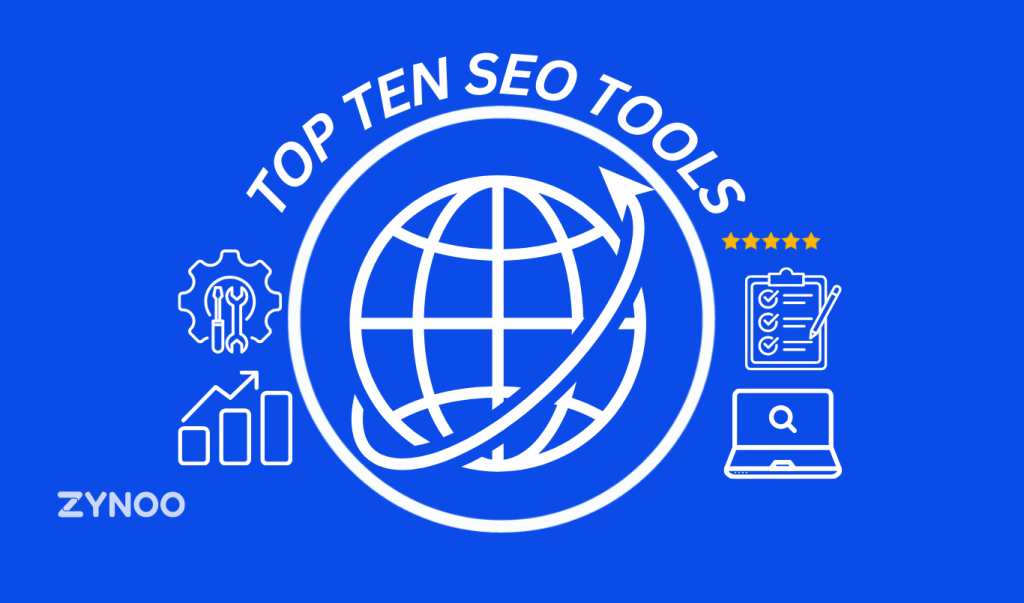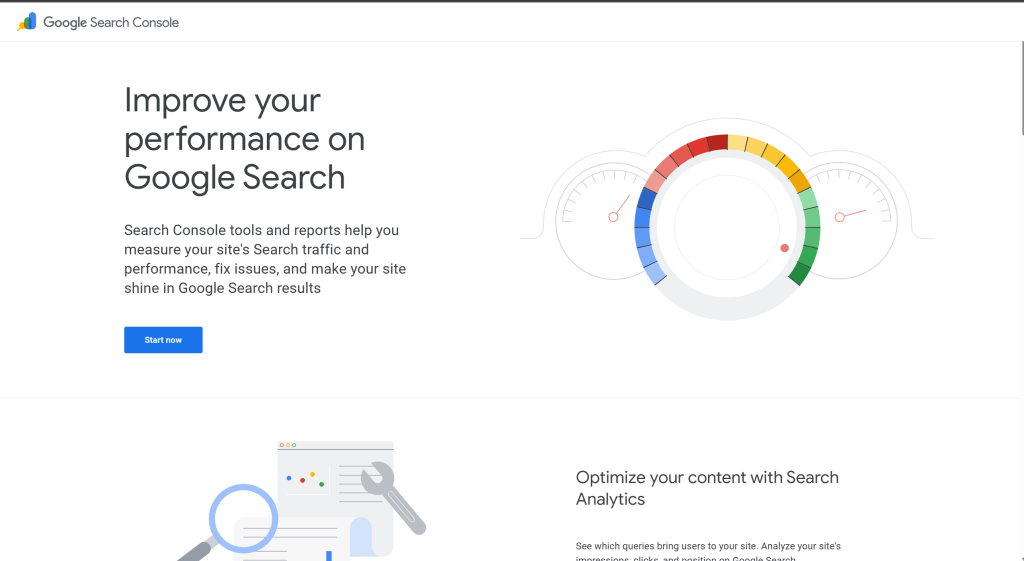Introduction
The digital landscape changes every year, but one thing remains the same: the Top 10 SEO tools are essential if you want your website to rank higher in Google and attract organic traffic.
In 2025, competition is tougher than ever. AI-driven content is flooding search results, GA4 has completely replaced Universal Analytics, and users expect faster, more relevant experiences. Without the right tools, staying ahead feels nearly impossible.
That’s where SEO tools come in. From keyword research and competitor analysis to content optimization and technical audits, these platforms provide the insights you need to succeed. But with so many options, the real question is: which SEO tools are best worth your time and money in 2025?
This guide breaks down the top 10 SEO tools — both free and paid — so you know exactly what to use, based on your goals and budget.

All-in-One SEO Suites
If you want everything under one roof — keyword research, competitor analysis, rank tracking, site audits — then all-in-one SEO suites are your best bet. They tend to be more expensive, but they save you time by consolidating multiple tools into a single platform.
Semrush: The All-in-One Powerhouse
Semrush has become a household name in SEO. It’s a complete suite covering:
- Keyword research
- Competitor analysis
- Rank tracking
- Site audits
- PPC insights
Marketers love Semrush because it provides deep competitor data, letting you see which keywords drive traffic to rival sites. Content creators use its SEO Writing Assistant to fine-tune blog posts. Agencies rely on its client reporting features.
The downside? It’s pricey. But if you run a business or manage multiple sites, Semrush is worth every penny.
Ahrefs: The Backlink & Keyword Research Giant
Ahrefs is best known for its backlink database, one of the largest in the industry. It’s the go-to tool for anyone who wants to:
- Audit backlinks
- Analyze competitors’ top-performing pages
- Discover new keyword opportunities
Its Site Explorer shows how competitors earn links, while Content Explorer helps you identify high-performing content ideas.
Ahrefs doesn’t try to do everything — it focuses on backlinks and keyword research, and it does those exceptionally well. If you’re building authority through content and links, Ahrefs is hard to beat.
SE Ranking: Affordable & Feature-Rich Alternative
SE Ranking strikes a balance between features and affordability. It offers:
- Rank tracking
- On-page SEO audits
- Competitor research
- Keyword tracking
What sets SE Ranking apart is its flexible pricing. Unlike Semrush or Ahrefs, which may be too costly for beginners, SE Ranking caters to small businesses and freelancers with lower monthly plans.
It may not have the massive databases of its larger competitors, but for most websites, it’s more than enough.
Moz Pro: User-Friendly SEO Suite
Moz has been around for years and remains a trusted name. With its Domain Authority (DA) metric, Moz popularized one of the most used SEO measurements.
Moz Pro includes:
- Keyword Explorer
- Site Crawl
- Link Explorer
- Rank Tracking
It’s designed with a user-friendly interface, making it great for beginners. While its data depth may not match Ahrefs or Semrush, Moz Pro shines for small businesses and marketers who need reliable insights without complexity.
Free & Technical SEO Tools
Not every powerful tool comes with a price tag. Some of the best SEO insights come from free or Technical SEO Tools that every site owner should use.
Technical SEO can feel overwhelming, but pairing the right tools with a solid strategy makes it manageable. If you’d like a deeper breakdown, check out our guide on technical SEO for step-by-step insights.
Google Search Console: Must-Have for All Websites

Google Search Console (GSC) is non-negotiable. If you run a website, you need it. It shows you:
- What queries bring users to your site
- How pages are indexed
- Any crawl errors or penalties
Best of all, it’s free. GSC is your direct line to Google’s view of your website, making it a foundational SEO tool.
Google Analytics (GA4): Understanding User Behavior
With Universal Analytics retired, GA4 is the new standard. While its interface takes some getting used to, GA4 offers:
- Event-based tracking
- Better cross-device insights
- Audience analysis
For SEO, GA4 helps you understand what users do once they land on your site. High bounce rates or short sessions can indicate content mismatches, guiding your optimization strategy.
Screaming Frog SEO Spider: Technical SEO Auditor
When it comes to crawling your site, Screaming Frog is a favorite. Its free version crawls up to 500 URLs, while the paid version unlocks more advanced features.
Screaming Frog identifies:
- Broken links
- Redirect chains
- Duplicate content
- Missing metadata
For technical SEO audits, it’s a must-have. Many agencies even use it alongside enterprise tools like Semrush or Ahrefs.
Content & On-Page SEO Tools
Great content isn’t just about writing — it’s about optimizing for both users and search engines. These tools help you bridge that gap.
Surfer SEO: AI-Powered Content Optimization
Surfer SEO uses AI and NLP (Natural Language Processing) to analyze top-ranking pages and recommend improvements. It tells you:
- How many words your article should have
- What keywords to include
- How to structure your content
It integrates with Google Docs and WordPress, making it ideal for bloggers and content marketers. Surfer SEO ensures your content is not only readable but also competitive.
As AI continues to reshape digital marketing, SEO tools are increasingly adopting machine learning and automation. For a deeper look at this transformation, check out our guide on artificial intelligence in SEO.
Yoast SEO and Rank Math: WordPress SEO Plugins
If your site runs on WordPress, Yoast SEO and Rank Math are essential plugins. They handle:
- Meta titles and descriptions
- Schema markup
- Internal linking suggestions
- Readability analysis
Yoast is the most popular, but Rank Math has gained traction with its feature-rich free version. Both are excellent for ensuring your on-page SEO is solid.
Ubersuggest: Budget-Friendly SEO Tool
Founded by Neil Patel, Ubersuggest is an affordable alternative to expensive SEO suites. It offers:
- Keyword suggestions
- Site audits
- Competitor analysis
Its interface is simple, and its pricing is beginner-friendly. While its database isn’t as vast as Ahrefs or Semrush, it’s perfect for small businesses looking for actionable SEO insights without breaking the bank.
Comparison Table: Features & Pricing
| Tool | Type | Pricing | Best For |
|---|---|---|---|
| Semrush | All-in-One Suite | $139 /month | Agencies, advanced marketers |
| Ahrefs | Backlink & Keyword | $99 /month | Link building, SEO pros |
| SE Ranking | Affordable Suite | $65 /month | SMBs, freelancers |
| Moz Pro | User-Friendly Suite | $99 /month | Beginners, small businesses |
| Google Search Console | Free | Free | Everyone |
| Google Analytics (GA4) | Free | Free | Behavior tracking |
| Screaming Frog | Technical SEO | Free / $200 yr | Site audits |
| Surfer SEO | Content Optimization | $99 /month | Bloggers, content teams |
| Yoast / Rank Math | WP Plugins | Free / Pro | WordPress users |
| Ubersuggest | Budget SEO Tool | $12 /month | Small businesses, beginners |
How to Choose the Right SEO Tool
With so many options, how do you choose? Here’s a quick guide:
- Beginners → Start with Google Search Console + Ubersuggest.
- Bloggers → Use Yoast/Rank Math + Surfer SEO for content optimization.
- Agencies → Invest in Semrush or Ahrefs for comprehensive analysis.
- Small Businesses → Try SE Ranking for affordability and balanced features.
- Technical SEOs → Add Screaming Frog for in-depth audits.
You don’t need every tool on this list — but combining 2–3 from different categories covers most SEO needs.
Future of SEO Tools
The Top 10 SEO Tools of today are already leaning heavily into AI-driven optimization, and this trend will only accelerate in the coming years.
Looking ahead, SEO tools will continue to evolve:
- AI-driven optimization will make recommendations more precise.
- Automation will streamline audits and reporting.
- Privacy-focused analytics will gain importance as regulations tighten.
Staying updated with tools that embrace these trends ensures your SEO strategy remains future-proof.
Final Thoughts on the Top 10 SEO Tools
SEO in 2025 requires more than guesswork — it requires the right tools. From free essentials like Google Search Console to powerful suites like Semrush and Ahrefs, the options are vast.
The key is to choose tools that match your needs and budget. Whether you’re a beginner blogger, a growing business, or a full-fledged agency, this list of the top 10 SEO tools gives you everything you need to make smarter decisions and boost your rankings.
FAQ
Google Search Console and Ubersuggest are perfect starting points. They’re free or affordable and easy to use.
Yes. While not as deep, tools like Ubersuggest and Google Search Console provide solid insights.
Yoast SEO and Rank Math are the top choices, offering metadata, schema, and readability analysis.
AI tools like Surfer SEO analyze top-ranking content using NLP and recommend improvements for your own content.



